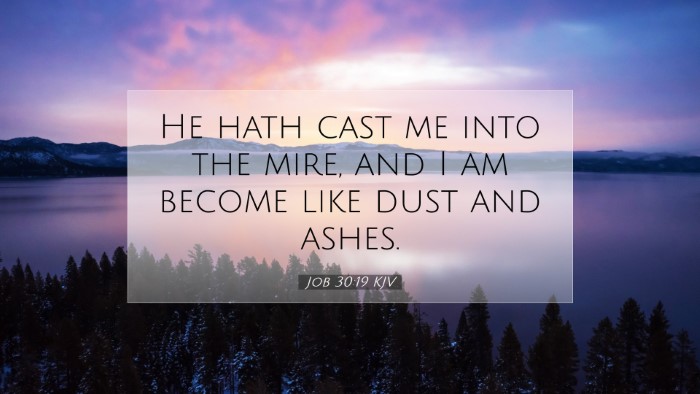Commentary on Job 30:19
Job 30:19 states: "He hath cast me into the mire, and I am become like dust and ashes." This verse encapsulates Job's deep sense of despair and isolation, reflecting the profound struggle he faces in the midst of his suffering. The commentaries from Matthew Henry, Albert Barnes, and Adam Clarke provide valuable insights into this scripture, illustrating the theological, emotional, and existential dimensions of Job's lament.
Contextual Analysis
This verse comes during a series of lamentations expressed by Job, where he recounts his transformation from a respected man to a person in utter desolation. The structure of the Book of Job demonstrates a deliberate literary framework that enhances the gravity of Job's trials. Job, once esteemed and honored, now finds himself in a state akin to the lowest of the low.
Matthew Henry's Commentary
According to Matthew Henry, Job's expression of being cast into the mire symbolizes a profound degradation. "The mire," he writes, "represents the depths of sorrow, where one's dignity is lost, and all that remains is shame." Henry emphasizes that Job feels as if he is sunk into a quagmire, illustrating a state of helplessness and utter abandonment. He also notes how Job’s comparison to dust and ashes can be seen both literally and metaphorically as it relates to human frailty and the ultimate insignificance of man before God.
Albert Barnes' Insights
Albert Barnes provides a slightly different yet complementary perspective. He expounds on the imagery of being cast into the mire and states, "This reflects not just physical suffering, but also moral and spiritual desolation." Barnes explains that in Hebrew thought, dust is often associated with death and humility. Thus, Job's statement indeed speaks to the depth of his anguish not just in terms of physical pain but also spiritual estrangement from God. Moreover, Barnes sees Job's anguish as a universal experience that resonates with anyone who has faced profound loss or suffering.
Adam Clarke's Reflections
Adam Clarke adds a pastoral dimension to the verse, highlighting the emotional turmoil Job experiences. He remarks: "Job’s plight is emblematic of humanity's struggle against adversity, where one feels forsaken by both friends and God." Clarke points out that Job's despondency raises significant theological questions about the nature of suffering and the perceived silence of God in our darkest times. He suggests that Job is essentially grappling with the apparent absence of divine justice and support amidst his trials.
Theological Implications
The intertwining insights of these commentators reveal profound theological implications within Job 30:19. The imagery of mire and ashes not only speaks to human suffering but also reminds theologians and scholars of the themes of humility, mortality, and the need for divine mercy. This verse challenges the reader to reflect on the nature of suffering and the understanding of God’s silence in times of trouble.
- The Human Condition: The verse exemplifies the fragility of life and the ease with which one can fall from grace. Each commentator underscores how Job's experience serves as a reminder of our vulnerability.
- The Role of Suffering: Job's lament provides a lens through which to examine the role of suffering in spiritual growth and understanding. It raises the question of whether suffering is a means of divine discipline or simply a product of worldly existence.
- God's Justice: The character of God is called into question when one considers Job's plight. The exploration of divine justice in the face of innocent suffering is a recurring theme explored by each commentator.
Practical Application for Pastoral Ministry
For pastors and ministry leaders, Job 30:19 offers a poignant opportunity for ministering to individuals experiencing despair. The verse can guide pastoral responses to suffering by reinforcing the need for empathy, understanding, and the assurance of God’s presence even when He seems distant.
- Encouragement in Suffering: Pastors can use these insights to encourage those who feel abandoned or in despair. Job's voice in this passage reminds us that it is okay to lament and express sorrow before God.
- Hope and Restoration: Additionally, it is important to point to the later chapters of Job, which reveal hope and restoration. This can inspire faith that beyond suffering, God has a purpose and a plan.
- Engaging Questions: Engage congregations with questions about their understanding of God during trials. What does it mean to trust in God when we feel like we are in the mire?
Conclusion
Job 30:19 serves as a powerful reminder of the depths of human suffering and the existential questions it raises. The combined insights from Matthew Henry, Albert Barnes, and Adam Clarke not only enrich our understanding of this passage but also speak to the heart of the Christian experience. In acknowledging our struggles, we find opportunities for both theological reflection and transformative pastoral care.


